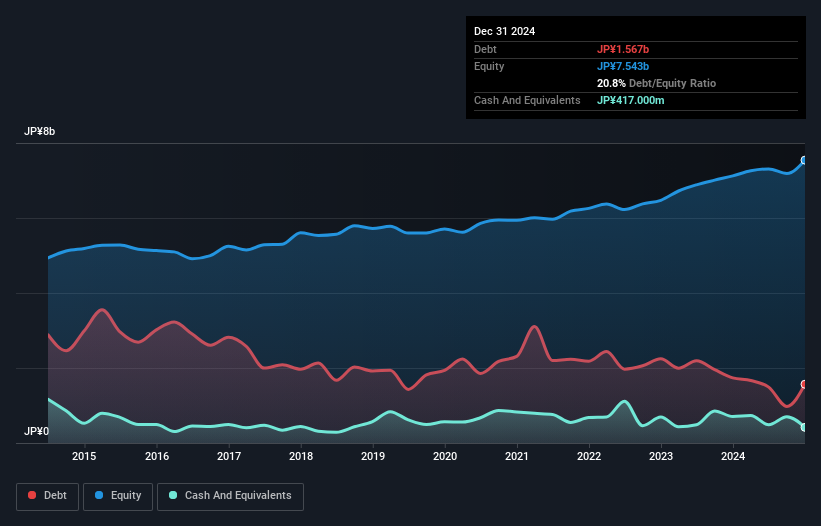These 4 Measures Indicate That Sugai Chemical Industry (TSE:4120) Is Using Debt Reasonably Well

David Iben put it well when he said, 'Volatility is not a risk we care about. What we care about is avoiding the permanent loss of capital.' So it seems the smart money knows that debt - which is usually involved in bankruptcies - is a very important factor, when you assess how risky a company is. Importantly, Sugai Chemical Industry Co., Ltd. (TSE:4120) does carry debt. But should shareholders be worried about its use of debt?
When Is Debt Dangerous?
Debt is a tool to help businesses grow, but if a business is incapable of paying off its lenders, then it exists at their mercy. Part and parcel of capitalism is the process of 'creative destruction' where failed businesses are mercilessly liquidated by their bankers. While that is not too common, we often do see indebted companies permanently diluting shareholders because lenders force them to raise capital at a distressed price. By replacing dilution, though, debt can be an extremely good tool for businesses that need capital to invest in growth at high rates of return. When we think about a company's use of debt, we first look at cash and debt together.
What Is Sugai Chemical Industry's Net Debt?
As you can see below, Sugai Chemical Industry had JP¥1.57b of debt at December 2024, down from JP¥1.74b a year prior. However, because it has a cash reserve of JP¥417.0m, its net debt is less, at about JP¥1.15b.

How Healthy Is Sugai Chemical Industry's Balance Sheet?
According to the last reported balance sheet, Sugai Chemical Industry had liabilities of JP¥2.69b due within 12 months, and liabilities of JP¥1.11b due beyond 12 months. Offsetting this, it had JP¥417.0m in cash and JP¥1.50b in receivables that were due within 12 months. So its liabilities total JP¥1.88b more than the combination of its cash and short-term receivables.
This is a mountain of leverage relative to its market capitalization of JP¥2.85b. This suggests shareholders would be heavily diluted if the company needed to shore up its balance sheet in a hurry.
View our latest analysis for Sugai Chemical Industry
In order to size up a company's debt relative to its earnings, we calculate its net debt divided by its earnings before interest, tax, depreciation, and amortization (EBITDA) and its earnings before interest and tax (EBIT) divided by its interest expense (its interest cover). Thus we consider debt relative to earnings both with and without depreciation and amortization expenses.
Sugai Chemical Industry has a low debt to EBITDA ratio of only 1.3. And remarkably, despite having net debt, it actually received more in interest over the last twelve months than it had to pay. So there's no doubt this company can take on debt while staying cool as a cucumber. In fact Sugai Chemical Industry's saving grace is its low debt levels, because its EBIT has tanked 55% in the last twelve months. When a company sees its earnings tank, it can sometimes find its relationships with its lenders turn sour. There's no doubt that we learn most about debt from the balance sheet. But you can't view debt in total isolation; since Sugai Chemical Industry will need earnings to service that debt. So if you're keen to discover more about its earnings, it might be worth checking out this graph of its long term earnings trend .
Finally, a company can only pay off debt with cold hard cash, not accounting profits. So it's worth checking how much of that EBIT is backed by free cash flow. Happily for any shareholders, Sugai Chemical Industry actually produced more free cash flow than EBIT over the last three years. There's nothing better than incoming cash when it comes to staying in your lenders' good graces.
Our View
Sugai Chemical Industry's EBIT growth rate was a real negative on this analysis, although the other factors we considered were considerably better. In particular, we are dazzled with its interest cover. Looking at all this data makes us feel a little cautious about Sugai Chemical Industry's debt levels. While we appreciate debt can enhance returns on equity, we'd suggest that shareholders keep close watch on its debt levels, lest they increase. There's no doubt that we learn most about debt from the balance sheet. But ultimately, every company can contain risks that exist outside of the balance sheet. For example, we've discovered 4 warning signs for Sugai Chemical Industry that you should be aware of before investing here.
At the end of the day, it's often better to focus on companies that are free from net debt. You can access our special list of such companies (all with a track record of profit growth). It's free.
New: Manage All Your Stock Portfolios in One Place
We've created the ultimate portfolio companion for stock investors, and it's free.
• Connect an unlimited number of Portfolios and see your total in one currency
• Be alerted to new Warning Signs or Risks via email or mobile
• Track the Fair Value of your stocks
Have feedback on this article? Concerned about the content? Get in touch with us directly. Alternatively, email editorial-team (at) simplywallst.com.
This article by Simply Wall St is general in nature. We provide commentary based on historical data and analyst forecasts only using an unbiased methodology and our articles are not intended to be financial advice. It does not constitute a recommendation to buy or sell any stock, and does not take account of your objectives, or your financial situation. We aim to bring you long-term focused analysis driven by fundamental data. Note that our analysis may not factor in the latest price-sensitive company announcements or qualitative material. Simply Wall St has no position in any stocks mentioned.
About TSE:4120
Sugai Chemical Industry
Manufactures and sells various chemicals in Japan.
Flawless balance sheet and good value.
Market Insights
Community Narratives



